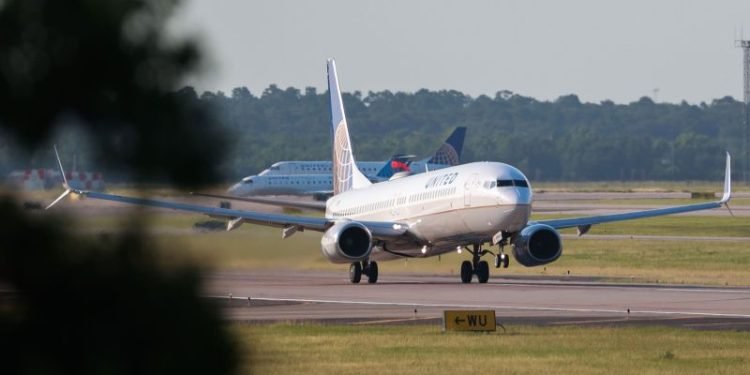Airline Schedules Disrupted as Severe Storms Cause US Flight Delays
Passengers Endure Lengthy Delays and Travel Chaos Amidst Severe Storms in the US

Claude Ronnie Msowoya and his family faced a frustrating ordeal as their journey to Johannesburg, South Africa was repeatedly disrupted. After a delayed United Airlines flight from Boston to Newark, they missed their connecting flight to Johannesburg. Despite being rebooked on another United Airlines flight, which was subsequently canceled, they received minimal assistance from customer service. After spending three days at Newark airport, the family decided to return home to Boston by train, still without their luggage.
Unfortunately, this story is not unique, as air travel disruptions continued for a fourth consecutive day due to powerful storms wreaking havoc across the United States. Over 4,200 flights were either delayed or canceled, particularly affecting busy centers in the mid-Atlantic and the Northeast. FlightAware data revealed more than 3,000 flights were delayed and over 1,100 were canceled. Although these numbers marked a significant decrease from the previous day's chaos when more than 11,000 flights were affected, the impact remained substantial.
United Airlines faced the most significant challenges among domestic carriers, with 14% of its schedule (410 flights) canceled and 22% (622 flights) delayed by 2 p.m. ET. Republic Airways, responsible for feeder flights to American Airlines, Delta, and United, had 28% of its schedule (260 flights) canceled.
The major hubs affected during this time were Newark Liberty in New Jersey, LaGuardia and John F. Kennedy airports in New York City, and Logan airport in Boston. Severe storms threatened over 40 million people in the northeastern and central plains, with a level 1 out of 5 threat issued for the Northeast and a level 3 out of 5 for parts of Kansas and Oklahoma.
Further thunderstorms were anticipated east of a cold front, which could lead to additional flight delays and cancellations. The storms had the potential to produce damaging winds and isolated flash flooding in parts of southeastern New York, Delaware, and Pennsylvania.
While weather conditions contributed to the problems, inadequate staffing at Federal Aviation Administration (FAA) air traffic control centers and limited capacity within US airlines exacerbated the situation. These challenges made it difficult for the system to handle disruptions caused by inclement weather and for passengers to secure alternative flights when their original ones were canceled.
In an internal memo, United Airlines CEO Scott Kirby placed blame on the FAA's air traffic controller staffing issues, which created "unprecedented challenges" affecting over 150,000 United customers during the past weekend. The reduction in arrival and departure rates at Newark Liberty International Airport led to extensive delays, cancellations, diversions, and disruptions to crew and aircraft positioning.
Kirby expressed his intention to meet with the FAA and the Department of Transportation to address the problem and prevent similar incidents from occurring throughout the summer. The FAA responded, stating its willingness to cooperate with anyone genuinely committed to solving the issue.
These disruptions occurred during a particularly busy period as millions of passengers prepared to travel by air for the upcoming long holiday weekend. The Transportation Security Administration predicted record-breaking air travel on July 4th, with 2.82 million passengers expected to be screened at airports nationwide. This surpasses the post-pandemic record set on June 16 and the pre-pandemic figure from July 7, 2019, which saw 2.79 million passengers screened by the TSA.

 chandni
chandni 



